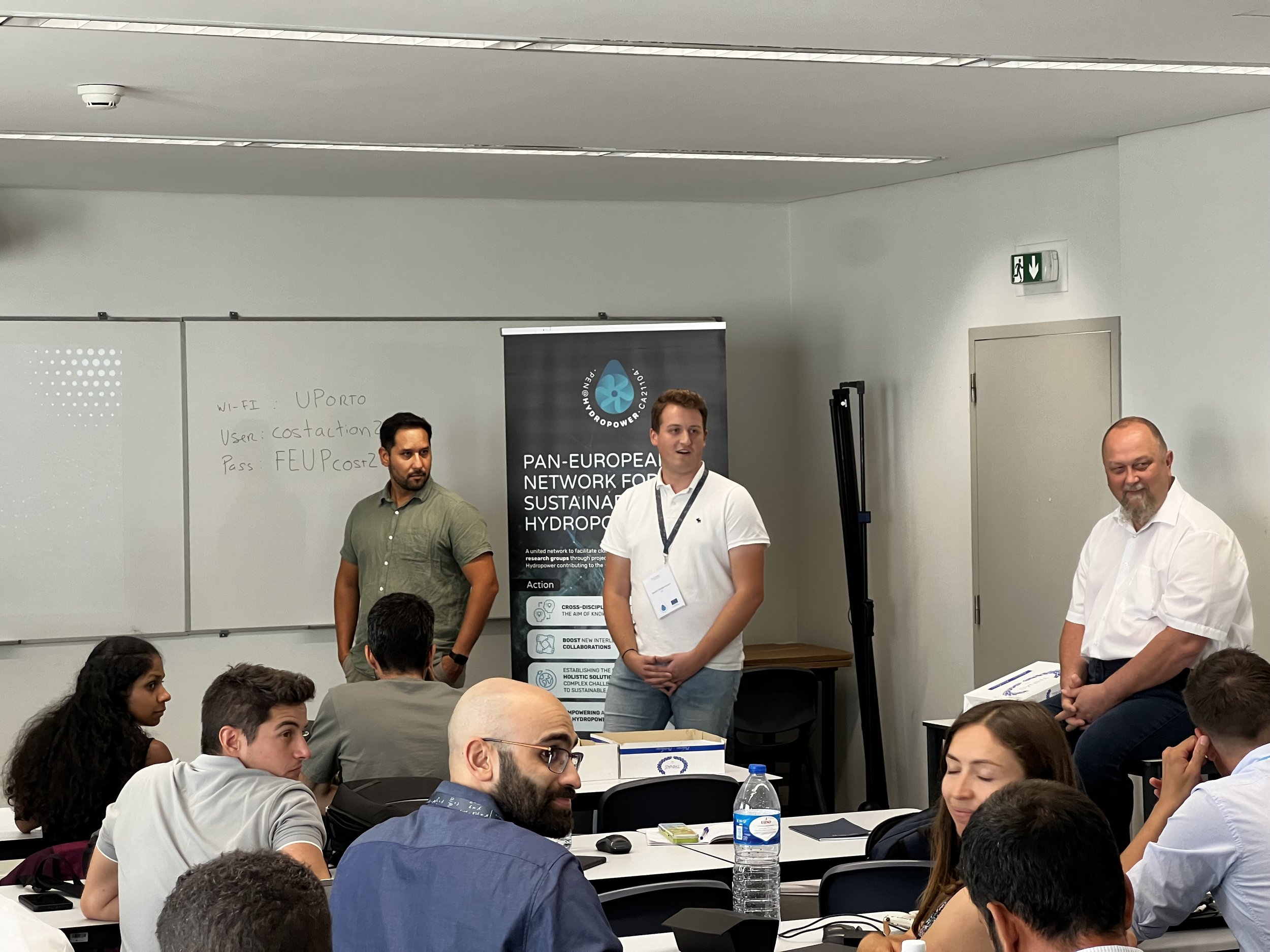PEN@Hydropower Sustainable Hydropower Training School in Porto
PEN@Hydropower successfully hosted its third Training School (TS 2-2) on Sustainable Hydropower in Porto, Portugal, from September 3rd to 6th, 2024. The event was funded by COST Action CA21104, VGBE, EERA, IHA, Andritz, AXPO Group and Salzburg AG and marked the second training school held in 2024. The training brought together 20 participants from both the academic and private sectors across Europe, offering a platform to deepen their understanding of sustainable hydropower practices.
Our training school was held at the Faculdade de Engenharia da Universidade do Porto, and was inaugurated by Eduard Doujak, Chair of PEN@Hydropower.
Key Highlights and Discussions
Throughout the training, participants engaged in a variety of sessions led by PEN@Hydropower's Working Group task leaders. The sessions introduced attendees to various aspects of sustainable hydropower, including technological innovations, climate change adaptation, stakeholder engagement, and clean energy transition. Some of the key presentations included:
Hydropower Flexibility: Prof. Oreste Fecarotta from the University of Naples Federico II highlighted the importance of flexibility in hydropower systems, addressing how hydropower can adapt to changing energy demands.
Technological Evolution: Pavel Rudolf from Brno University of Technology presented an overview of recent technological advancements and their impact on hydropower's efficiency and sustainability.
Hydrology and Climate Change: Ritesh P. from the University of Oulu discussed the effects of hydrology, extreme weather events, and climate change on hydropower systems.
Hydropower and the Clean Energy Transition: Ewa Malicka from Towarzystwo Rozwoju Małych Elektrowni Wodnych explored the role of hydropower in Europe’s clean energy transition, emphasizing the need to balance renewable energy production with environmental preservation.
Stakeholder Engagement: Marina Cerpinska led discussions on the importance of engaging stakeholders throughout the lifecycle of hydropower projects to ensure sustainable outcomes.
Participants also discussed the role of sustainability standards in hydropower projects. Jian-hua Meng from HTWG Hochschule Konstanz introduced the Hydropower Sustainability Standard (HS Standard), a framework that evaluates the environmental, social, and governance (ESG) impacts of hydropower projects. The group deliberated on how to effectively promote these standards, weighing the benefits of environmental protection and community engagement against potential challenges such as increased costs and complexity.
Field Visit to Foz Tua Hydropower Plant
A key feature of the training school was a field visit to the Foz Tua Hydropower Plant in Vila Real, located approximately 120 km from Porto. This hydroelectric power plant, operational since 2017, has a generating capacity of 274 MW, producing 305 GWh annually. Participants applied the Hydropower Sustainability Assessment Protocol (HSAP) to assess the plant's environmental and social impacts, water flow management, and infrastructure safety. They also examined the plant’s interaction with the surrounding UNESCO-protected area.
Students collaborated in teams, representing perspectives from various stakeholders such as local communities, NGOs, operators, and government bodies. The discussions yielded insights on the cumulative impacts of hydropower projects, exploring how renewable energy can coexist with environmental preservation.
Guest Speakers and Final Reflections
The Training School featured guest speakers João Costa, Executive Director of the Hydropower Sustainability Alliance, and Jian-hua Meng, a professor of Water Resources Management and a member of the Hydropower Sustainability Council’s Governance Committee. Both shared their extensive experience and expertise, discussing the pillars of the Hydropower Sustainability Assessment Protocol (HSAP) and the importance of creating sustainability certification systems.
As the Training School concluded, participants reflected on the valuable knowledge gained and the networks they built during the event. PEN@Hydropower extended its gratitude to the Portuguese hosts, including Prof. Isabel Boavida, Prof. Paulo Diogo, and the broader organizing team. The event provided a hands-on experience that deepened participants' understanding of hydropower sustainability and laid the foundation for future collaborations in the field.
With the success of this year’s Training School, PEN@Hydropower looks forward to continuing its mission of advancing sustainable hydropower practices through education, collaboration, and innovation. Stay tuned for next year's edition!

